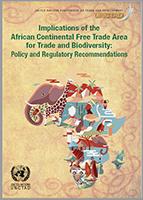
Africa is one of the world’s most biodiverse regions, and many African countries have a comparative advantage in the abundance and variety of biological resources. Furthermore, a majority of the population in Africa depends directly upon biodiversity and ecosystem services for their food and livelihoods,6 whereas natural capital accounts for between 30 per cent and 50 per cent of the total wealth of most African countries.
The creation of the African Continental Free Trade Area (AfCFTA) through the entry into force of the Agreement Establishing the AfCFTA (AfCFTA Agreement), on 30 May 2019, presents important opportunities for boosting intra-African trade and promoting development that is environmentally, socially and economically sustainable.
The AfCFTA is central to achieving the continental integration envisioned in the Organization for African Unity’s Treaty Establishing the African Economic Community (Abuja Treaty) and the African Union’s Agenda 2063: The Africa We Want (Agenda 2063). It is also expected to drive the economic transformation needed to foster the sustained and inclusive growth required to help African countries to implement the 2030 Agenda for Sustainable Development (Agenda 2030) and achieve the Sustainable Development Goals.
The AfCFTA is pivotal to Africa’s development strategy and ambitions. Concerted efforts must be made to ensure that the instruments still under negotiation under the AfCFTA framework deliver a comprehensive set of agreements that boosts intra-African trade, using the opportunity to include features and policies that serve the needs of all African countries.
Supplying growing global consumer demand for natural, healthy, environmentally friendly, just and ethical products and services offers a new avenue to strengthening the legal and sustainable production, trade and consumption of biodiversity-based goods and services.
A targeted approach under the AfCFTA could thus foster intra- African trade in biological resources and derived value added products and services, while conserving globally significant biodiversity, furthering mitigation of and adaptation to climate change, and improving livelihoods.
This study reviews the potential implications of, and
opportunities presented by the AfCFTA for legal and sustainable trade in biodiversity/BioTrade and access and benefit-sharing (ABS).
-
Section 1 explores the concept of BioTrade, addresses the substance of the updated BioTrade Principles and Criteria published in 2020 by UNCTAD, and illustrates how BioTrade has been implemented in Africa.
-
Section 2 presents a historical overview of African trade integration, beginning with the creation of the Organization for African Unity (OAU) in 1963 and concluding with the entry into force of the AfCFTA Agreement in 2019.
-
Section 3 provides a general overview of the broader links between trade and environment, trade in goods, including non-tariff barriers (NTBs), trade in services, intellectual property rights (IPRs), competition policy, and cooperation.
The study concludes by identifying potential points for engagement, as implementation is still in the very early stages, and negotiations on protocols and additional annexes continue.


